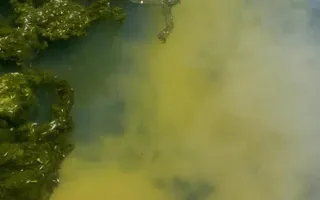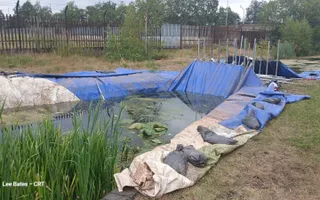We're acting to contain the spill and begin the long recovery of the canal and wildlife in the area. We're seeking to raise £25,000 to help with this immediate response. All donations will go directly to supporting this work, making it a tangible way that people can act to show their support.
Extremely distressing
Henriette Breukelaar, our regional director for the West Midlands said: “The chemical spill on the Walsall Canal has been extremely distressing, and has caused great harm to local wildlife. We know that so many people share our outrage at what happened last week and will want to help the response. Of course, the company responsible should pay, but the timing and outcome of the investigation by the Environment Agency is uncertain, and we must act now to protect nature as best we can.
“Our canals matter, not only to the local communities but to everyone else as well – because canals enhance the natural environment, they help to mitigate climate change, and they are integral to our future water security and supply. Events like this highlight how vulnerable they can be, and how important it is that they are properly protected.”
The spillage
On 12 August there was a toxic chemical spillage in Pleck, Walsall. The spillage went into the canal in Walsall and initially a 12-mile stretch of canal was closed as a precaution. Sodium cyanide was discovered in the water, and it was treated as a major incident, with a multi-agency response including, the Trust, Environment Agency, Walsall and Sandwell Councils, the UKHSA, the emergency services and Severn Trent. We have been a part of the swift emergency response and worked around the clock with the lead agencies to secure the canal and contain the contamination to avoid it spreading further along the canal.
Following thorough testing by the Environment Agency, the restricted zone has now been reduced to just over half a mile. A section of the Walsall Canal from James Bridge on Bentley Mill Way in Darlaston to Rollingmill Street in Walsall remains closed until further notice. In this area chemicals, including sodium cyanide and zinc cyanide, have been found at elevated levels.
The impact on wildlife
Paul Wilkinson, our senior ecologist, said: “The spillage has been contained to a relatively small area, but the impact on wildlife remains to be seen. Fish in the affected area have been killed and other wildlife in the area may have been affected. Sadly, we expect the aquatic ecosystem will have been devastated or lost for the section the pollution has passed through, from the smallest invertebrates right up to the otter that has a territory through that section. This is possibly our last recorded location of water voles on our waterways within the Birmingham & Black Country region from our 2022 citizen science surveys. Without natural balance, invasives and algae will quickly take over: the impacts could take years to fully recover.
“The crowdfunding campaign will directly support wildlife recovery efforts in the area in the coming months alongside our continuing clean-up work. All the donations to this crowdfunder will be gratefully received and will make an immediate difference in the immediate clean up, helping us start to repair the damage.”
The Environment Agency is carrying out an investigation into the incident.





